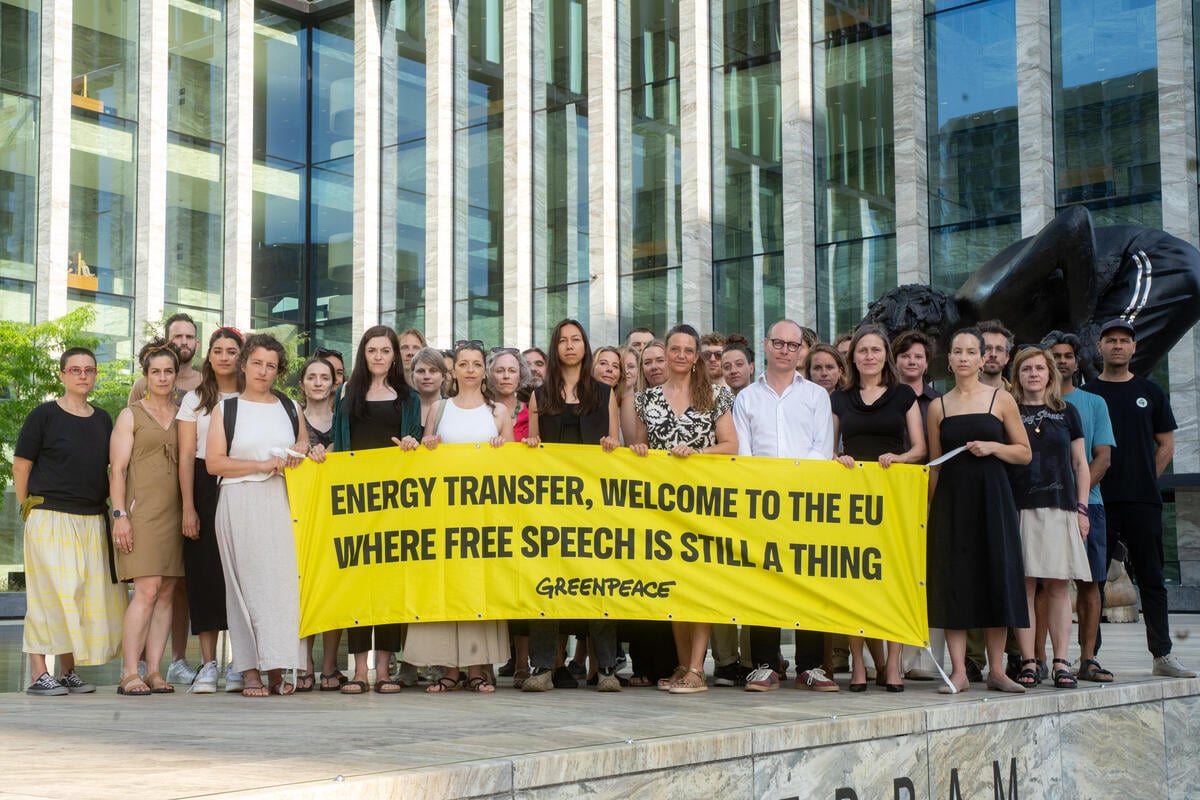In response to the Ford government’s announcement that it will introduce legislation requiring gas companies to put carbon price stickers on pumps, Greenpeace Canada said it would challenge these stickers under the Canadian Code of Advertising Standards. By omitting both the costs of climate change and information on the federal rebates, we believe that these stickers would violate the provision of the Code that states “Advertisements must not omit relevant information if the omission results in an advertisement that is deceptive or misleading.”
Greenpeace Canada’s senior energy strategist Keith Stewart said:
“Transparency cuts both ways. Doug Ford can’t pretend climate change doesn’t exist or that it isn’t already imposing heavy costs on our health and communities. These stickers are a cheap attempt to mislead Ontarians with half-truths that cannot be allowed to go unchallenged. We are already dealing with the financial fallout from more extreme storms, flooding and heat waves and these will only get worse the longer politicians like Doug Ford deny the severity of the climate crisis and delay action to solve it.”
-30-
For more information, please contact:
Keith Stewart, Senior energy strategist, Greenpeace Canada
[email protected]; +1 416 659-0294





Discussion
This long lost article has an easy target to hit but misses entirely. The real target is the basic dishonesty of the ads. They claim what the mythical average individual/family - it's not clear which - is paying for gasoline at the pumps but the number they give is a projection they've made based on a 'business as usual' scenario based on past data; as we know, vehicle fuel efficiency is steadily improving and 2022 is a long way forward from 2015. Of course, in an effort to force reality to match their imagination, they've cancelled programs that would encourage people to invest in EVs and PHEVs. In any case, the current burden on taxpayers is actually a bit less then the tax rebate that was paid in advance. What they don't say, probably intentionally, is that the provincial gasoline tax is 3.34X higher than the federal carbon tax and, in spite of promising a 10c/liter reduction, that cut is not forthcoming. Their claim that they are concerned about the cost of gasoline at the pumps, is disingenuous. At the same time, electrification of public transit seems seems to have reached the third phase of we came, we saw, we doddled. In their 'Made in Ontario' plan and elsewhere they outright lie about GHG emissions from power generation which they claim to be 4% in 2017, or virtually 0 elsewhere when actual data shows ~6.6% for NG, diesel and bio-fuel. While they take credit for the liberal's closing of coal plants, they somehow manufacture a cost when, according to NRCAN, the cost of NG generation is 26% lower than the coal it replaced. They also ignore nuclear power which continues to emit radioactive tritium to air and water sufficient to cause complaint from our American neighbors. In fact, the base price of electricity in the competitive hourly market in Ontario has steadily declined in the last decade; it is the global adjustment that has blossomed with the leading component being the high contract price of nuclear power and associated curtailment fees and upgrade costs (a legacy of Harris conservatives blowing up of Ontario Hydro); the second largest component is incentive level pricing of wind and solar projects, which likely give them a bad name (certainly, pricing for the same in other jurisdictions including some in the US is much more competitive). Another piece is transmission and distribution losses and bottle-necking of hydroelectric capacity. Be that as it may, Ford opposes going further to decarbonize the power generation preferring to rest on the laurels of the previous liberal government. If one compares the map of Ontario and Quebec grids, there are salient differences: first, only a fraction of the Ontario grid is even 532 kV while Quebec's now old standard is 735 kV morphing into high voltage DC; second, Quebec's network has many long extensions into the US to take advantage of high demand for renewable energy with high market value. Meanwhile, the Ford government doesn't value or even understand the export opportunity while IESO sees the US market as a place to dump surplus production. These salient differences are a legacy of the Harris government that somehow missed the point that supply and logistics need to be tightly coupled for best efficiency. As far as acknowledging climate change, the 'Made in Ontario' plan does devote a fair amount of space to resilience to climate change effects. This perhaps weakens the main argument of this article; maybe not: it's possible that Ford hasn't actually read this document. However, dealing with the consequences is a weak alternative to dealing with the cause.